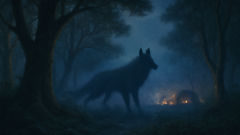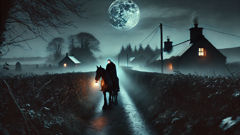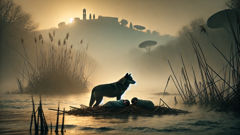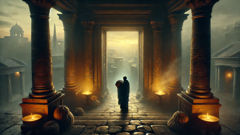Introduction
Long before the world came to know Transylvania as the land of fabled vampires and haunted castles, its forests whispered older, darker tales. Among twisted oaks and mossy boulders, villagers lit fires against the encroaching dark, each flame a trembling beacon in a wilderness thick with legend. The villagers of Borna, a remote hamlet cupped by the Carpathians, knew that the boundary between the living and the dead was thinnest on moonless nights. In those restless hours, superstitions weren’t just cautionary tales—they were lifelines.
It was in this hush of dread that the Pricolici was said to prowl. Not just any beast, the Pricolici was believed to be the soul of a wicked man, risen from the grave by the weight of his crimes. Unlike ordinary wolves or mere specters, the Pricolici wore the shape of a monstrous wolf, its eyes burning with malicious intelligence and its howl echoing the agony of damnation. The stories claimed it brought death, sickness, and despair, its presence signaled by the sudden chill that swept through the fields, or the inexplicable withering of crops. For generations, the people of Borna recited prayers at sunset, marked their doors with garlic and ash, and left offerings at the forest’s edge to placate the spirits. Yet, none dared to speak openly of the Pricolici, for fear that the very mention of its name might summon its hunger.
This story begins on such a night, when the wind carried more than the scent of pine and woodsmoke. Ilinca, the village healer, felt the change in the air—a pulse of ancient fear that made even the bravest dogs whimper. In her modest hut, tucked beside a gnarled elm, she pressed a sprig of mugwort between her palms, heart pounding as distant howls threaded through the silence. That night, the moon hid its face, and the shadows stretched long and hungry. What unfolded would test the courage and faith of Borna’s people, forcing them to confront not only the beast in the forest but the darkness buried in their own hearts. From the murky depths of Romanian folklore, a legend would rise—and for Ilinca and her kin, nothing would ever be the same.
I. The Wolf’s Shadow
The night the Pricolici returned to Borna, the wind carried the scent of fear. It began with a death: old Marin, the village drunkard, found sprawled at the edge of the forest. His body bore no wounds save for a single bite to the throat—a wound too clean and savage for any ordinary wolf. Rumors slithered through the streets, tangled with prayers and curses. The elders whispered of the old times, recalling winters when children vanished from their beds and livestock were found gutted by something with a hatred deeper than hunger.
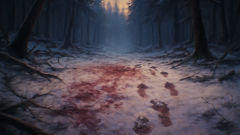
Ilinca knelt beside Marin’s body in the pale dawn, her breath frosting as she traced the bite mark with trembling fingers. She had seen wolf attacks before—never like this. The villagers crowded behind her, clutching icons and muttering prayers. Among them was Father Petru, his beard bristling with frost, eyes narrowed with dread.
"This is no wolf," he murmured, voice trembling. "This is retribution for sins unconfessed."
The words rippled through the crowd. Ilinca’s heart tightened. She was the healer, trusted for her skill with herbs and poultices, but her mother’s blood ran with Romani superstition, and many saw her as a bridge between worlds. She felt their eyes upon her, heavy with unspoken questions.
That night, Ilinca’s sleep was broken by a sound outside her hut—a dragging, shuffling noise, as if something clawed at the earth. She peered through the frost-rimed window and saw nothing, only the restless trees swaying in a wind she couldn’t feel. But her dreams were vivid: a monstrous wolf prowling between gravestones, its eyes gleaming with a hateful intelligence, jaws stained with blood.
The next day, another body was found—Ana, the baker’s daughter, barely sixteen. Her body lay atop a mound of churned soil at the cemetery’s edge, as if she had tried to claw her way free before succumbing to the beast. The village’s fear hardened into panic. Men fashioned crude stakes and sharpened sickles; women smeared garlic at windows and daubed holy symbols above their doors.
Father Petru called a meeting in the church. The candlelit nave shivered with tension as he spoke of ancient evils and cursed souls. “The Pricolici is no mere animal,” he intoned, “but a man’s soul, damned for his wickedness, risen to torment us. Only faith and unity can save us.”
Ilinca listened from the shadows, her mind racing. The Pricolici was more than a story; it was a curse—and every curse could be broken if one understood its root. She remembered her grandmother’s tales: how the soul of a murderer or a traitor might become such a beast if denied proper rites. That night, she searched her hut for old charms and talismans, gathering wild rue and iron nails, whispering the prayers she’d learned as a child.
But the beast was clever. It struck again—Liviu, the woodcutter, torn from his doorstep just after dusk. Blood spattered the snow, and wolf prints twisted impossibly into human footprints as they vanished into the trees. Panic spread like wildfire. Some blamed outsiders, others accused their neighbors. The village teetered on the edge of collapse.
Ilinca was determined to learn the truth. With her childhood friend Gavril, a stoic hunter who knew every shadow of the forest, she set out to track the creature. They followed the trail—broken branches, paw prints too large to be natural, the faint copper tang of blood on the wind—deep into the woods.
The forest grew silent around them. Every sound—owl calls, the snap of twigs—made Ilinca’s heart race. Gavril carried his father’s axe, knuckles white. At last, they found a clearing where the snow was stained red and a single wolf paw print melted into a bare human foot. It was then Ilinca realized: the Pricolici was someone from Borna. Someone whose evil had poisoned the earth and whose soul would not rest.
II. Roots of Evil
Ilinca’s mind spun with possibilities. Who among them bore such darkness? She sought out the oldest villagers, those who remembered Borna’s secrets. In the flickering firelight of cramped cottages, she listened to tales of betrayal—crimes buried beneath layers of silence and guilt.
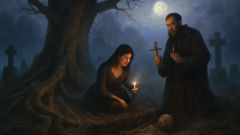
From hunched old Maria she learned of Gheorghe, a cruel landowner who’d died in disgrace years before. He’d cheated his tenants, beaten his wife, and vanished one stormy night. His body was never found—only his bloodied coat, tangled in thorns near the cemetery. Maria whispered that no priest had dared bless Gheorghe’s grave, for fear his evil would taint the hallowed ground.
Ilinca pressed for more. Some spoke of curses laid on the land, of a tree in the cemetery whose roots were said to feed on the bones of sinners. But superstition alone couldn’t explain the horror stalking Borna now.
Gavril returned with news: another flock of sheep slaughtered at the edge of the forest, their bodies arranged in a circle. In their midst, a crude wooden effigy—a man’s figure with a wolf’s head—had been left as a warning. The elders gathered, panic and suspicion thick in the air. Some demanded blood sacrifices to appease the beast; others accused Ilinca herself, recalling her Romani heritage and her mother’s whispered spells.
Father Petru stood by Ilinca’s side, but even his resolve was wavering. “If this is Gheorghe’s soul returned,” he told her, voice rough with fear, “we must perform the rites denied him. Only then can his spirit rest.”
Together, they devised a plan. While Gavril and the bravest men guarded the village, Ilinca and Petru would search for Gheorghe’s unmarked grave. At midnight, armed with iron nails, salt, holy water, and Ilinca’s charms, they crept through the mist to the cemetery. The air was thick with fog, the moon a pale smudge behind clouds.
They found the cursed tree—its roots gnarled and twisted above a shallow mound. Ilinca’s heart hammered as she scattered salt in a circle and Petru murmured prayers. With trembling hands, they dug. The earth yielded easily, as if eager to give up its secret. There, beneath rotting roots, they uncovered the bones of a man. The skull was cracked, a rusted signet ring still clinging to one bony finger. Petru sprinkled holy water and drove an iron nail through the breastbone, sealing the curse.
As they finished, a howl split the night—closer than ever. Shadows writhed at the edge of the graveyard. Ilinca glimpsed a monstrous form: a wolf as large as a bear, fur matted with blood, eyes glowing with hellish light. Its gaze locked on hers, and for a moment, she saw something almost human in its anguish.
She flung a charm at its feet. The beast recoiled, yowling in pain, then vanished into the trees. The ritual had weakened it, but not destroyed it. Ilinca realized the curse ran deeper than bones and blood—it was fed by the village’s own fear and guilt. Until those wounds healed, the Pricolici would return.
The next days were filled with dread. The beast was wounded but desperate. It lashed out with ferocity, attacking livestock, stalking children, and leaving bloody warnings on doorsteps. Some villagers fled; others barricaded themselves indoors.
Ilinca refused to abandon hope. She gathered the villagers in the square and spoke openly of the curse. She demanded confessions—of old grudges, secret crimes, sins never atoned for. One by one, the villagers admitted their faults: thefts, betrayals, acts of cruelty buried by shame. With each confession, the village seemed to lighten—as if a pressure had lifted from the air.
But there was one who would not confess: Dumitru, the blacksmith. His eyes burned with resentment; he spat on the ground and called Ilinca a witch. That night, he vanished from his forge. Come morning, all that remained were bloody footprints leading into the forest.
III. Night of Reckoning
The village held its breath as darkness fell. Gavril led a patrol along the edge of the forest, lanterns bobbing in the gloom. Ilinca sat alone in her hut, tending to her charms and mixing poultices for wounds that would not heal. The howl came just before midnight—a guttural, rage-filled cry that sent every dog in Borna whimpering under beds.
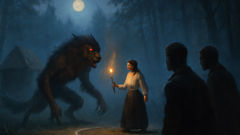
Ilinca knew this was the endgame. The Pricolici was wounded and desperate; it would strike one last time before dawn. She wrapped herself in a cloak woven with protective symbols and tucked her grandmother’s iron cross into her belt. Gripping a torch and a pouch of salt, she hurried to the edge of the forest, heart pounding in her chest.
Gavril met her there. “You shouldn’t face it alone,” he said, but Ilinca shook her head. “It seeks me because I’m not afraid. That is its weakness.”
Together they advanced into the darkness, guided by the beast’s mournful howls. The trees pressed close, their branches arching overhead like grasping hands. In a moonlit clearing, they found Dumitru—his clothes torn, his eyes wild with terror. He confessed everything: years ago, he’d betrayed Gheorghe, luring him to his death for gold. The curse had claimed him as well.
As Dumitru sobbed, the Pricolici emerged from the trees—a monstrous wolf, its fur bristling with malice. But Ilinca saw its eyes were full of pain, not rage. She stepped forward, voice steady. “You were a man once. If you seek peace, you must let go of your hate.”
The beast hesitated. Gavril raised his axe, but Ilinca stopped him. She scattered salt in a circle and began to chant, her voice mingling ancient Romani words with Christian prayers. Dumitru, trembling, repeated her words, confessing his crime again and begging forgiveness.
The air shivered. The Pricolici howled—once, twice—and then its form began to waver. Flesh melted to shadow, bones twisting and cracking as it shrank. In place of the beast stood Gheorghe’s shade, gaunt and weary.
“I am free?” he rasped.
Ilinca nodded, tears in her eyes. “Go in peace. Let your hatred end here.”
The spirit faded into mist, and the forest grew still. Ilinca collapsed, exhaustion overwhelming her. Gavril caught her and helped her home.
Come dawn, the village awoke to silence. No howls, no blood—only the chirping of birds and the creak of thawing branches. Ilinca was hailed as a hero, but she shrugged off praise. “It wasn’t magic,” she said. “It was courage—the courage to face our own darkness.”
In time, Borna healed. Fields bloomed again, children played without fear, and Ilinca’s hut was never empty. She became more than a healer—she was a guardian of stories, reminding all who listened that evil thrives only when we refuse to name it. And in the deepest nights, when mist curled around the village and wolves sang in the hills, people remembered the legend of the Pricolici—and the healer who faced it without fear.
Conclusion
The legend of the Pricolici endured in Borna long after the terror faded. It became a story whispered by firelight—of a beast born from a soul’s wickedness, and of a healer’s steadfast heart. Ilinca lived to old age, never once wavering in her devotion to her people. She taught that true protection came not from charms or rituals alone, but from honesty and unity. The villagers learned to confront their failings and seek forgiveness, weaving strength from the threads of community.
Even as generations passed and new fears rose to challenge Borna, the memory of the Pricolici served as both warning and reassurance. Evil, they understood, could only thrive in darkness and silence. Once brought into the light and named, it lost its hold. The forests still held their secrets—shadows and howls and mysteries that defied reason—but Borna’s people faced them together.
And in the hush between dusk and dawn, when the world seemed poised between hope and despair, parents told their children of Ilinca—the healer who faced the darkness not with weapons or magic alone, but with compassion and courage. The Pricolici’s curse was broken not by force, but by understanding and redemption—a lesson as old as the mountains themselves.

